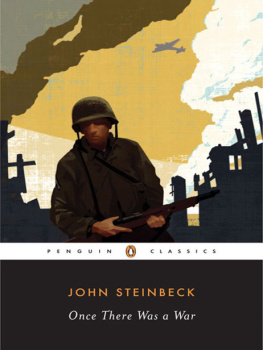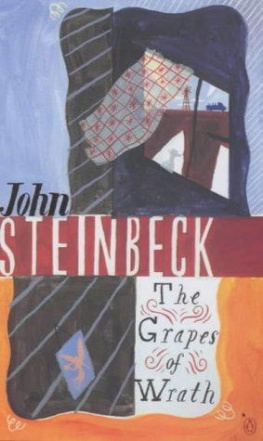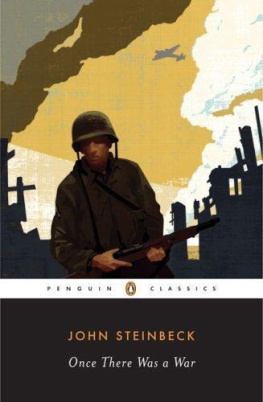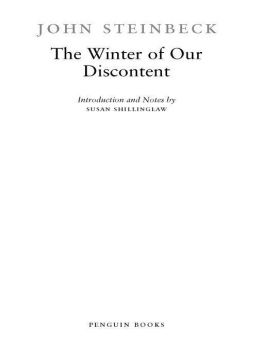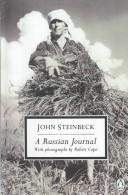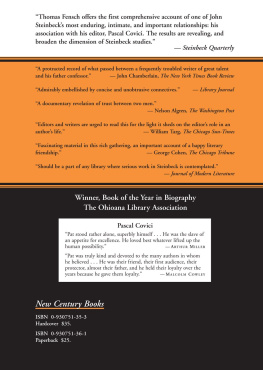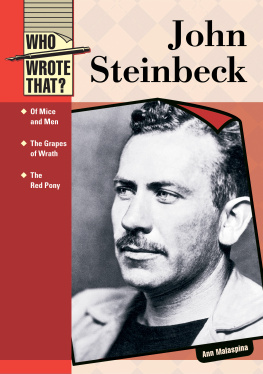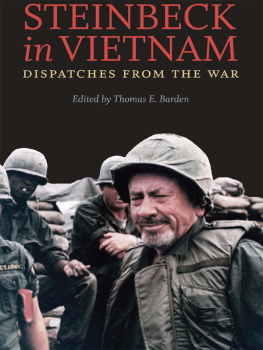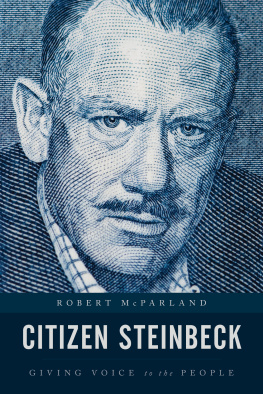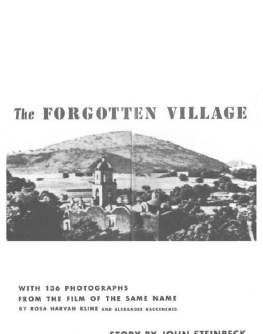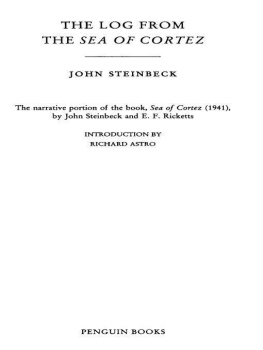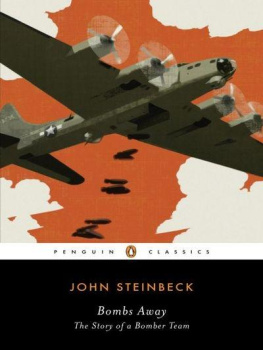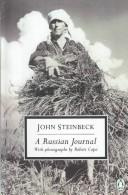Table of Contents
ONCE THERE WAS A WAR
Born in Salinas, California, in 1902, JOHN STEINBECK grew up in a fertile agricultural valley about twenty-five miles from the Pacific Coastand both valley and coast would serve as settings for some of his best fiction. In 1919 he went to Stanford University, where he intermittently enrolled in literature and writing courses until he left in 1925 without taking a degree. During the next five years he supported himself as a laborer and journalist in New York City, all the time working on his first novel, Cup of Gold (1929). After marriage and a move to Pacific Grove, he published two California fictions, The Pastures of Heaven (1932) and To a God Unknown (1933), and worked on short stories later collected in The Long Valley (1938). Popular success and financial security came only with Tortilla Flat (1935), stories about Montereys paisanos. A ceaseless experimenter throughout his career, Steinbeck changed courses regularly. Three powerful novels of the late 1930s focused on the California laboring class: In Dubious Battle (1936), Of Mice and Men (1937), and the book considered by many his finest, The Grapes of Wrath (1939). Early in the 1940s, Steinbeck became a filmmaker with The Forgotten Village (1941) and a serious student of marine biology with Sea of Cortez (1941). He devoted his services to the war, writing Bombs Away (1942) and the controversial play-novelette The Moon Is Down (1942). Cannery Row (1945), The Wayward Bus (1947), The Pearl (1947), A Russian Journal (1948), another experimental drama, Burning Bright (1950), and The Log from the Sea of Cortez (1951) preceded publication of the monumental East of Eden (1952), an ambitious saga of the Salinas Valley and his own familys history. The last decades of his life were spent in New York City and Sag Harbor with his third wife, with whom he traveled widely. Later books include Sweet Thursday (1954), The Short Reign of Pippin IV: A Fabrication (1957), Once There Was a War (1958), The Winter of Our Discontent (1961), Travels with Charley in Search of America (1962), America and Americans (1966), and the posthumously published Journal of a Novel: The East of Eden Letters (1969), Viva Zapata! (1975), The Acts of King Arthur and His Noble Knights (1976), and Working Days: The Journals of The Grapes of Wrath (1989). He died in 1968, having won a Nobel Prize in 1962.
MARK BOWDEN is the author of the New York Times bestseller and National Book Award finalist Black Hawk Down as well as Road Work, Killing Pablo, and Guest of the Ayatollah. He is a national correspondent for the Atlantic Monthly and teaches creative writing and journalism at Loyola College in Maryland.
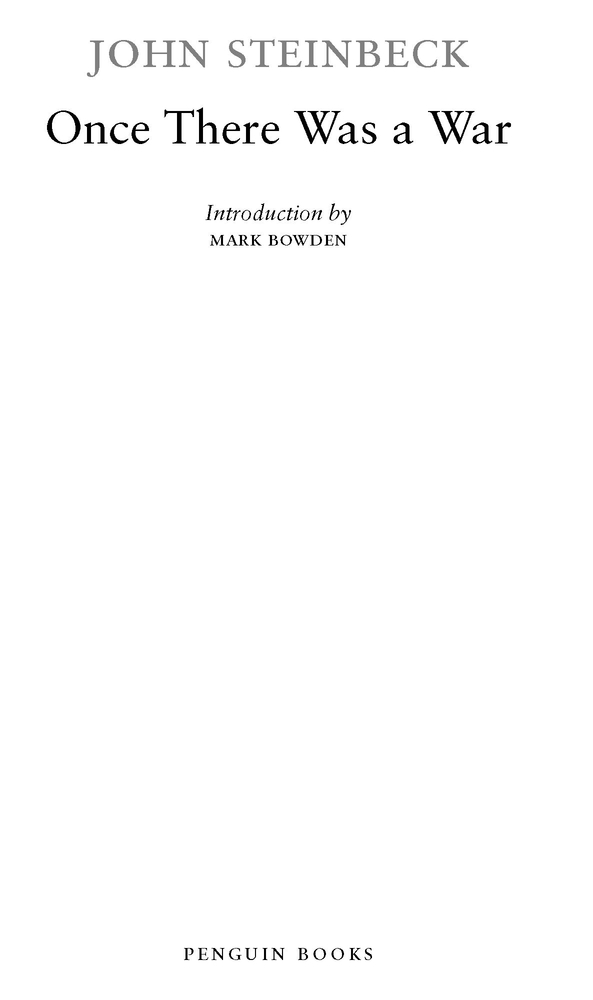
PENGUIN BOOKS
Published by the Penguin Group
Penguin Group (USA) Inc., 375 Hudson Street, New York, New York 10014, U.S.A.
Penguin Group (Canada), 90 Eglinton Avenue East, Suite 700, Toronto,
Ontario, Canada M4P 2Y3 (a division of Pearson Penguin Canada Inc.)
Penguin Books Ltd, 80 Strand, London WC2R 0RL, England
Penguin Ireland, 25 St Stephens Green, Dublin 2, Ireland (a division of Penguin Books Ltd)
Penguin Group (Australia), 250 Camberwell Road, Camberwell,
Victoria 3124, Australia (a division of Pearson Australia Group Pty Ltd)
Penguin Books India Pvt Ltd, 11 Community Centre, Panchsheel Park, New Delhi - 110 017, India
Penguin Group (NZ), 67 Apollo Drive, Rosedale, North Shore 0745,
Auckland, New Zealand (a division of Pearson New Zealand Ltd)
Penguin Books (South Africa) (Pty) Ltd, 24 Sturdee Avenue,
Rosebank, Johannesburg 2196, South Africa
Penguin Books Ltd, Registered Offices:
80 Strand, London WC2R 0RL, England
First published in the United States of America by The Viking Press 1958
Published in Penguin Books 1977
This edition with an introduction by Mark Bowden published 2007
Copyright John Steinbeck, 1943, 1958
Copyright renewed Elaine Steinbeck, John Steinbeck IV and Thom Steinbeck, 1971, 1986
Introduction copyright Mark Bowden, 2007
All rights reserved
The dispatches in this book appeared in the New York Herald Tribune and other newspapers.
LIBRARY OF CONGRESS CATALOGING IN PUBLICATION DATA
Steinbeck, John, 1902-1968
Once there was a war / John Steinbeck ; introduction by Mark Bowden.
p. cm.
eISBN : 978-1-4406-3399-7
1. World War, 1939-1945. I. Title.
D743.S65 2007
940.53dc22 2007016061
The scanning, uploading and distribution of this book via the Internet or via any other means
without the permission of the publisher is illegal and punishable by law. Please purchase
only authorized electronic editions, and do not participate in or encourage electronic
piracy of copyrighted materials. Your support of the authors rights is appreciated.
http://us.penguingroup.com
Introduction
There is little in this classic collection of reporting that reveals the fascinating journey of the Nobel Prize-winning author behind them.
John Steinbeck could easily have avoided World War II. When he shipped out as a correspondent in 1943, he was already world famous for The Grapes of Wrath, which had been awarded the Pulitzer Prize for literature and turned into a popular and acclaimed film. He was too old for the draft at age forty-one, and was living an enviable professional life, with publishers eager for his next novel and Hollywood as his playground. He was a celebrity. Newspapers had covered every detail of his recent divorce and remarriage, and when he decided to leave his bride in New York in order to help cover the war, that, too, was news.
So why go to war? Patriotism was part of it. Steinbeck had benefited early in his career by some of the New Deal programs for writers and artists during the Depression, and may have felt a desire to give something back, to use his talent to further the War Effort, a concept he described with typically wry insight in the introduction to this volume. But perhaps the deeper reason was the urge felt by most men in those years to see action, to play some role in, if only to witness, the sweeping historical drama of the age. The world was traumatically changing shape, and to be on the sidelines must have felt like being dealt out of the future. Recruited directly by President Franklin D. Roosevelt, the novelist first contributed by writing propagandaperhaps the most talented hack ever pressed into such service. He wrote a novel, The Moon Is Down, for a precursor to the CIA, and the book BombsAway, about a bomber crew, for the Office of War Information. But when Steinbeck pressed for work closer to the front lines, he was told he would need to be commissioned as a military officer. As if determined to prove that there is no boon too great for government bureaucracy to squander, his request to become an air force intelligence officer was scuttled by his local draft board in California, which concluded on the basis of rumor and suspicion alone that the author of The Grapes of Wrath was sufficiently communistic to be regarded as a security risk. Thwarted, Steinbeck complained to friends at a dinner party in New York, lamenting that he would never see the war. He was promptly offered the job of correspondent for the

